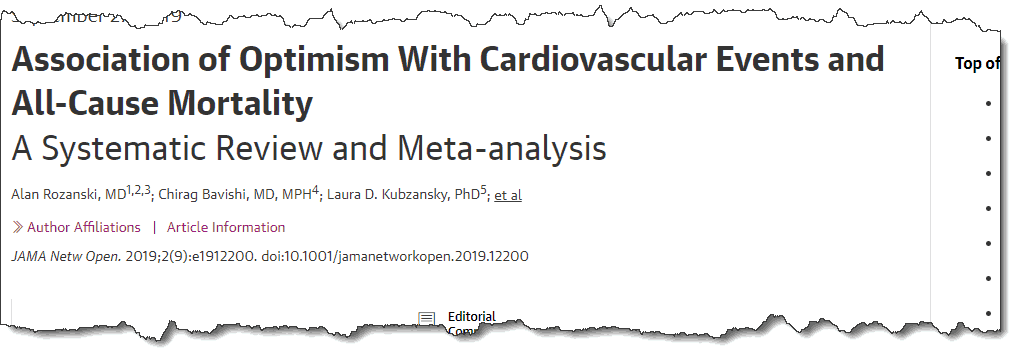
Just do this — it’s fun and you’ll probably live a lot longer

—-Important Message From Our Sponsor—-
How to ‘reactivate’ your God Molecule and extend lifespan
Scientists from the University of Michigan have discovered how a special ‘God Molecule’ could be the key to becoming young again.
The lucky few seniors who possess high levels of this ‘God Molecule’ are physically healthier, and more youthful than those who do not.
And the great thing is — your body can already produce this ‘God Molecule’ naturally.
All you’ve got to do is ‘reactive’ it…
Go here to discover how to become naturally young again, as revealed by Dr. Ryan Shelton
———-
Doing this cuts risk of death by 50% for men over 65
One of the things that I love to do is travel with my lovely wife Jodie.
I enjoy trips overseas, but I also REALLY love going to Florida in the winter time (I work while I’m there).
I do tons of research and create courses to help the guys (and occasional gal) that I work with. And I write stuff like this.
I also walk along the beach every day and watch the pelicans fly overhead…
It’s awesome.
Travel helps keep me optimistic.
I really dislike cold weather and being cooped up indoors.
It makes me miserable… and I can’t afford to be miserable because being miserable and pessimistic cuts your life short… I plan on living until I’m 120.

Can optimism really help you live longer?
Today, I’m going to talk about a stunning set of studies that show that the skill of optimism (which you can learn) helps you to live longer.
It’s remarkable how much this simple skill can help lower risks for all kinds of death – including what is nicely termed as “cardiovascular events” or heart attacks.
A 2004 study showed a direct link between being optimistic and having lower risks of heart problems than those who describe themselves as pessimists.
“Patients who described themselves as highly optimistic had lower risks of all-cause death and lower rates of cardiovascular death than those with high levels of pessimism, according to an article in the November issue of The Archives of General Psychiatry, one of the JAMA/Archives journals.”
This study was done over 10 years with patients from 65 to 85 years old – and optimists cut their risk of death by over half!
“Compared to participants who reported a high level of pessimism, participants reporting high levels of optimism had a 55% lower risk of death from all causes, and a 23% lower risk of cardiovascular death.”
Even for patients who had “short life expectancies otherwise,” optimism was remarkably effective at helping folks live better and longer.
“A predisposition toward optimism seemed to provide a survival benefit in elderly subjects with relatively short life expectancies otherwise.”
But it’s not just this one study!
In a meta-analysis of 15 different studies, optimism continued to show a protective effect.
“In this meta-analysis of 15 studies including 229,391 individuals, optimism was associated with a lower risk of cardiovascular events and pessimism was associated with a higher risk of cardiovascular events – the pooled association was similar to that of other well-established cardiac risk factors.”
The data is in…
Optimism will help you live longer and happier.
“An association between higher optimism and a lower risk for specific cardiac outcomes, including angina, myocardial infarction, and cardiac death…”
Now, if you are a pessimist by nature you might be despairing at this point.
But you don’t have to. Optimism can be learned.
Optimism is a skill, not a personality trait.
The good news is that, even if you are typically a pessimist, you can learn over time how to become more of an optimist.
There are two things that I’ve seen that work exceptionally well for people.
► Do things you like and look forward to.
I know this seems like a small thing, but it is quite significant.
If you take charge of your life and plan things to look forward to (even small things), it can help you develop an attitude of optimism.
► Keep a gratitude journal.
Write down three things you are grateful for either at the beginning or end of each day.
They can even be minor things (such as the crispness of an apple). This will also help you become more optimistic.
Bottom line:
Optimism is a huge gift to yourself and your health and it’s worth cultivating.
It can help you live longer, be happier doing it, and cut down on negative health events.
—-Important Message—-
What is the biggest difference between youth and old age?

Metabolism.
Young people are always full of energy and in great health because they have hot, high metabolisms.
They burn sugar for energy.
However, older men get cold and sluggish and their metabolisms slow down.
And they burn only fat for energy.
And this opens them up to weight gain, “rockiness” problems, diabetes, prostate issues, and even cancer.
So how do you restore a hot, high metabolism?
———-

Association of Optimism With Cardiovascular Events and All-Cause Mortality – A Systematic Review and Meta-analysis
https://jamanetwork.com/journals/jamanetworkopen/fullarticle/2752100
